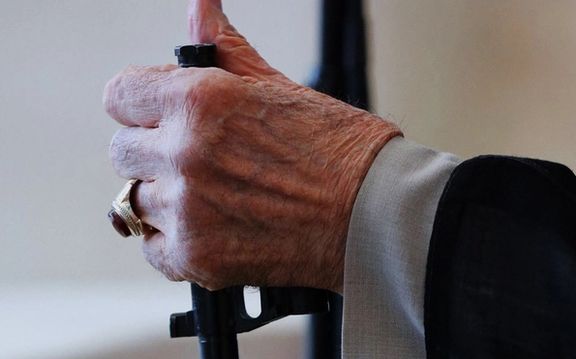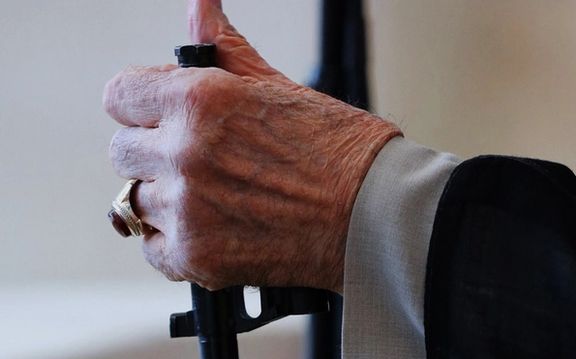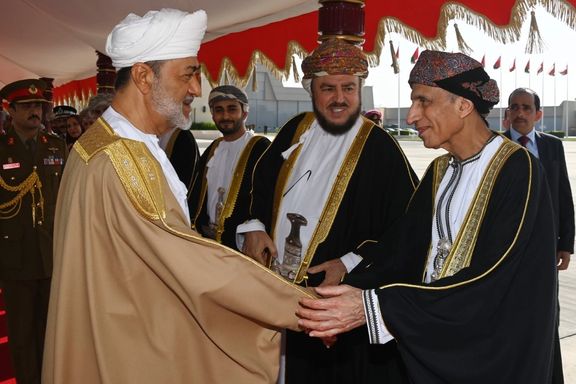Related Articles
Iran approached negotiations with the United States out of weakness and desperation, Abbas Milani, director of the Iranian Studies Center at Stanford University told Iran International.
"The negotiations indicate that the Islamic Republic is in absolute weakness, in complete desperation," Milani said.
He called Iran's insistence on indirect talks childish and “more foolish and damaging than direct negotiations,” arguing that Iranian officials, including Foreign Minister Abbas Araghchi, are fully aware of the Islamic Republic's vulnerability.
“They will negotiate on all issues,” Milani said, adding that Iran is at its “weakest point—reviled by the people, isolated in the region and trapped in a massive economic crisis.”
Supreme Leader Ali Khamenei's oft stated mantra of "no war and no negotiations" with the United States became untenable when US President Donald Trump gave a stark ultimatum that he reach a nuclear deal or face attack.
Read the full analysis here.


Supreme Leader Ali Khamenei's oft stated mantra of "no war and no negotiations" with the United States became untenable when US President Donald Trump gave a stark ultimatum that he reach a nuclear deal or face attack.
But his acquiescence to US-Iran talks in Oman on Saturday is no wholesale foreign policy rethink or road to Damascus moment: it’s a calculated attempt to buy time.
With Trump back in office and US military power amassing in the region, Khamenei is reverting to a familiar strategy: de-escalate just enough to avoid war, preserve the Islamic Republic’s strategic position, and wait out American pressure.
The meeting on Saturday in Muscat is not aimed at resolving the nuclear standoff or reimagining Iran’s regional role. It’s about lowering the temperature while holding onto the core pillars of Iranian power: the nuclear program, the missile arsenal and the regional proxy network.
This is a playbook Khamenei has used for decades: resist until pressure becomes untenable then pause, rebrand retreat as “heroic flexibility,” and regroup.
The phrase was deployed in 2013 to justify his negotiations with the Obama administration, casting diplomacy with Tehran's hated enemy as in line with precedent set by beleaguered Islamic leaders in times past.
Hibernation
In 2019, when Japan’s Prime Minister Shinzo Abe brought a message from then-President Trump, Khamenei publicly trashed him: “I do not consider Trump a person worthy of exchanging messages with.”
At the time, there was no imminent threat of war. Today is different. US B-2 stealth bombers are within striking distance and two carrier strike groups patrol the region.
When a message reportedly containing a direct threat was delivered recently via an Emirati official, Khamenei studied it and the circumstances closely.
His assent to talks is less a pursuit of detente and more a strategic hibernation.
Khamenei knows war is the one scenario that could shatter the domestic control and regional clout the wily 85-year-old autocrat has built up for decades.
Slowing enrichment, muzzling proxies and entering talks buys him time without sacrificing his accomplishments.
The Islamic Republic is weakest on its home front. Sanctions have ravaged the economy. Sporadic protests from 2017 to 2022 - all quashed with deadly force - have exposed cracks in the edifice of his rule.
A war could push those toward breaking point.
A tactical negotiation, by contrast, offers the topmost leadership breathing space on the streets, among elites and within the ruling system.
Survival instinct
A keen survival instinct has defined Khamenei’s rule. Since becoming President in 1981 and then Supreme Leader in 1989, he has outlasted seven US presidents and weathered assassination attempts, sanctions, cyberattacks, sabotage, isolation and bombing.
Key to his longevity is adjusting tactics, but never core goals.
The 2015 nuclear deal was not a concession but a gain. Iran accepted temporary caps on enrichment but secured international recognition of its right to enrich—a red line Khamenei had long defended.
The 3.67% cap was low, but the principle was enshrined. A higher percentage could wait. When Trump left the deal in 2018, Khamenei didn’t escalate immediately, but bided his time.
Once Biden, perceived as less belligerent, came to office, Iran accelerated its program. Enrichment rose to 60% by the end of his term, advanced centrifuges were installed, and underground facilities expanded.
According to the United Nations nuclear watchdog, Iran now possesses enough highly enriched uranium to build several nuclear weapons if it chooses to.
De-escalate, regenerate
With Trump back in power and military pressure mounting, Khamenei is adapting to survive. The hope is likely to de-escalate, rein in the nuclear program, quiet the proxies, and preserve its infrastructure to avoid provoking direct confrontation.
Iran’s influence in the region has eroded significantly. Hezbollah is under pressure. Hamas is boxed in. Perhaps most significantly, Iran has lost Syria as a key ally, depriving it of a key pillar of its regional axis.
Still, Iran does not see these setbacks as irreversible. Israeli officials often describe the Islamic Republic as an octopus with a head in Tehran and limbs spread across the region. When an octopus loses a limb, they can grow back.
Khamenei believes that if the system survives Trump, its regional reach can regenerate.
Time and money
Key to those hopes will be mollifying the United States for as long as Trump is in office - a goal which could plausibly be achieved by restraining nuclear activity and scaling back proxy operations, with or without a deal.
If that restraint can be packaged into an agreement, all the better.
A deal would formalize what he is already prepared to do and buy yet more time. If it comes with sanctions relief or cash, it will be no compromise but an outright win: a payment to wait Trump out.
But the red lines remain. If Trump’s team demands the dismantling of Iran’s nuclear infrastructure, permanent limits on missile capabilities or the disbanding of its regional allies, talks will collapse.
Khamenei seeks not peace in our time but more time on the clock.
Diplomacy, in this context, is not a gateway to a new regional order but a heat shield against a blowup. The goal is not to settle but to survive.
A calculated pause could mark the start of another cycle of hibernation in a long game in which confrontation is still the overall policy of a supreme leader who knows war is the only thing he cannot afford.
If US President Donald Trump’s shock announcement in the Oval Office on Wednesday that his administration was due to hold talks with Iran this weekend was a surprise, the choice of Oman as host was not.
For years, the Sultanate has supported diplomatic back-channels between the United States and Iran, and has built up a record as a credible intermediary trusted by both sides.
Explore the full story here.


If US President Donald Trump’s shock announcement in the Oval Office on Wednesday that his administration was due to hold talks with Iran this weekend was a surprise, the choice of Oman as host was not.
For years, the Sultanate has supported diplomatic back-channels between the United States and Iran, and has built up a record as a credible intermediary trusted by both sides.
Rather than act as a mediator, as other regional states such as Qatar have done, and participate in direct talks themselves, the Omani approach is to create the spaces in which dialogue can take place, thus acting more as a facilitator.
A combination of historical and geographical factors explains Oman’s pragmatic facilitation of diplomacy as a key element in its foreign policy approach.
Unlike several of its Gulf neighbors, Oman has not had a history of poor relations with Tehran, and Omanis recall that Iran under the Shah provided important support to Sultan Qaboos during the early years of his reign in the 1970s.
Even after the Iranian revolution ousted the Shah in 1979 and ushered in the theocracy headed by Ayatollah Khomeini, Oman stood aside from the regional rivalries and competition for geopolitical influence in the Gulf.
The contours of Omani foreign policy were usefully set out in 2003 by Sayyid Badr Albusaidi, a career diplomat who became Foreign Minister in 2020.
Albusaidi said "it is possible for a small state to carve out for itself a degree of relative autonomy" and "we try to make use of our intermediate position between larger powers to reduce the potential for conflict in our immediate neighborhood."
Avoiding 'I told you so'
As such, Omani officials have sought to ensure that disputes and flashpoints which have the potential to escalate into outright conflict, and thereby threaten economic and political stability and regional security, can be addressed before they spiral out of control, by leveraging their ability to engage with all sides.
Oman’s support for the backchannel that enabled US and Iranian officials to meet secretly for multiple rounds of talks in 2012 and 2013 is the most well-known example of such facilitation.
The clandestine contacts were detailed by Bill Burns, then Deputy Secretary of State, in his memoir, written before he returned to office as Director of the CIA in 2021. Burns described how the chief of Sultan Qaboos’s court and the head of Omani intelligence "greeted both delegations as we walked into the meeting room" and "offered a few brief words of welcome and then departed."
The talks succeeded in laying the framework for the subsequent P5+1 negotiation which led to the Joint Comprehensive Plan of Action, the Iran nuclear deal, in 2015, from which Trump withdrew in 2018 during his first term.
The JCPOA collapsed in acrimony and appeared to prove Burns’s point when he wrote that Araghchi and his co-delegation leader, Majid Takht-Revanchi, "would sometimes confide in me that they had a Supreme Leader who was just waiting to say 'I told you so' and prove that the Americans could not be trusted."
Secret no more
Omani officials continued to act as periodic intermediaries between Tehran and Washington. This included hosting indirect talks in 2023 and again in 2024 that involved White House Middle East coordinator Brett McGurk and Iranian nuclear negotiator Ali Bagheri that addressed the Houthi attacks on maritime shipping and the tit-for-tat Israeli and Iranian military strikes that threatened all-out regional war.
With this record in mind, it was unsurprising that the Iranian leadership responded to a letter from Trump, delivered by an Emirati intermediary, raising the prospect of talks, through Oman in late-March.
It remains to be seen whether the talks, indirect or direct or possibly a combination of the two, may lead to any form of breakthrough, given the political constraints on both sides and the legacy of decades of distrust.
In addition, the fact that the talks have been very publicly announced is a major departure from the secrecy of the backchannel in 2013 which was more characteristic of Oman’s discreet approach to diplomacy.
The choice of venue and interlocutor nevertheless reaffirm Omani centrality to the dialogue between two arch nemeses who despise each other but trust Muscat.
